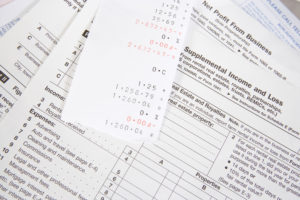How Long Should You Keep Your Business Tax Records?
Every year, as your small business files its taxes, your company is left with stacks of paperwork. You may shove it into a filing cabinet or a storage box. However, eventually, you may wonder: How long do I need to keep these tax records? The IRS provides some basic standards concerning the retention of small business tax records. Here is what they say about:
Business Tax Returns and Supporting Documentation
 Permanently keep copies of your business tax returns and related supporting documents to help you prepare future or amended returns.
Permanently keep copies of your business tax returns and related supporting documents to help you prepare future or amended returns.
- Keep all supportive evidence (i.e., receipts, bank statements, invoices, proofs of purchase, asset records, databases, and correspondence) that document any business income, deduction or credit shown on your tax return until the “period of limitations” runs out for that tax return. The period of limitations is the time period from your filing date during which you can either amend your tax return to claim a credit or refund, or the IRS can pursue your business for additional
- In general, keep tax records for a minimum of 3 years.
- If you file for a credit or refund after you’ve filed your tax return, you must keep your tax records for 3 years from the date you filed your tax return, or two years from the date you paid the tax – whichever is later.
- If you filed a deduction for a bad debt or worthless security, keep your supporting tax records for at least 7 years.
- If you failed to report income that you should have reported, the IRS can come after your business for up to 6 years after you filed your taxes if the amount is more than 25% of your business’s gross income.
- Keep tax records indefinitely if you didn’t file a tax return or you filed a fraudulent return.
Note: Beginning in 2017, if you e-filed your tax return last year, the IRS will require information – such as your prior-year self-select PIN or your prior-year adjusted gross income – to authenticate your identity when completing this year’s tax return.
Employment Tax Records
If you have employees, keep all employment tax records for at least 4 years after the date those taxes were due or paid, whichever is later. Employment tax records include your employer identification number, dates and amounts of wage, annuity and pension payments and tax deposits; the names, addresses, social security numbers, employment dates and occupations of employees; and allocated tips and fringe benefits records.
Employer-provided Health Care Information
Keep health care information with other tax records for 3 years after tax return filing date. Health care information includes employer-provided coverage, premiums paid, advance payments of the premium tax credit received, and the type of coverage.
Business Asset Records
If your business owns property, retain records regarding the property until the period of limitations ends from the year you disposed of the property. These records will help you calculate any depreciation, amortization, or depletion deductions and to determine any gain or loss on that property when you sell or dispose of the property.
Note: Even though we live in a digital age, your record preservation need to include both paper and electronic documents.
Effectively Managing Your Business Tax Records
At The Payroll Department, we often hear stories about small business owners who scramble each year to complete their business tax returns due to poor bookkeeping habits. With our bookkeeping solutions, we can help your small business efficiently manage your accounts, so tax time is no longer a challenge. Plus, by outsourcing your company’s payroll to The Payroll Department, you’ll no longer have to worry about possible payroll errors and omissions. And we’ll ensure your business stays in compliance with IRS regulations. Give us a call at 317-852-2568 to learn more about all our services.
-Ariane of The Payroll Department Blog Team
